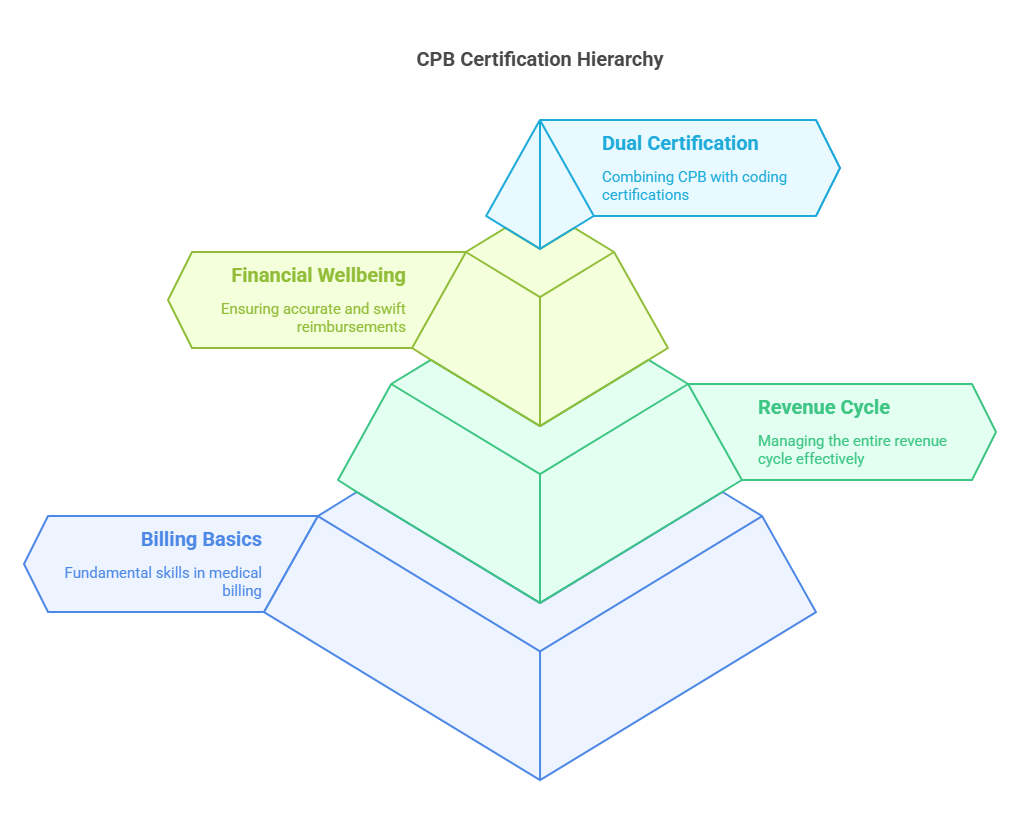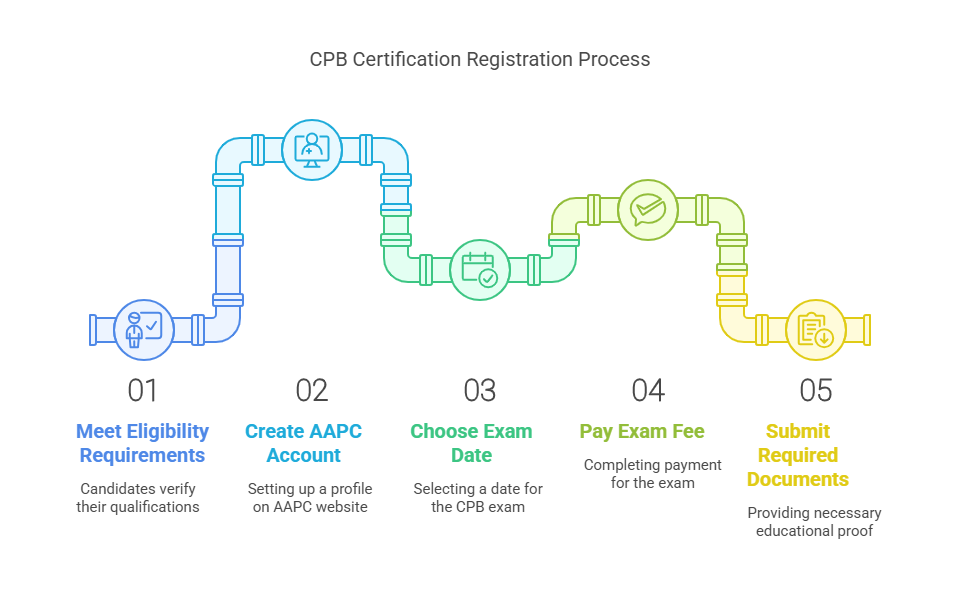Comprehensive Guide to CPB Certification for Medical Billers
Curious about the differences between certified public bookkeepers and CPB certification? This guide covers everything you need to know about CPB certification, from its benefits and eligibility criteria to exam structure and preparation tips.
Key Takeaways for Achieving CPB Certification Success
The CPB certification is essential for medical billing professionals, ensuring expertise in managing billing processes and supporting the financial stability of healthcare providers. Offered by AMBCI, this medical billing and coding certification helps professionals demonstrate their knowledge and competence in the field. Candidates must meet specific eligibility criteria, including educational qualifications and professional experience, to effectively prepare for the CPB exam. Continuous professional development is required to maintain CPB certification, including completing 24 hours of Continuing Professional Education (CPE) annually to stay updated on industry best practices.
Understanding CPB Certification in Medical Billing
The CPB (Certified Professional Biller) credential is tailored for experts in medical billing, providing them with vital competencies to manage the entire revenue cycle effectively. This ensures that healthcare providers can process billing and secure reimbursement promptly, which includes handling medical billing claims efficiently. Possessing this certification is essential as it equips medical billers with the ability to safeguard a healthcare provider’s financial wellbeing by guaranteeing precise and swift reimbursements. A lack of such expertise in a medical biller could significantly disrupt the reimbursement cycle, thereby affecting a practice’s financial health.
Attaining the CPB certification encompasses an array of knowledge within medical billing. It often goes hand-in-hand with other coding certifications like CPC (Certified Professional Coder), allowing professionals to enhance their qualifications through dual-certification endeavors. Such combined credentials—referred to as CPC + CPB—not only deepen one’s proficiency but also fortify their employability within this competitive sector by offering comprehensive insights into both coding and billing disciplines.

Eligibility Criteria for CPB Certification
It is recommended that individuals seeking to take the CPB exam possess a minimum educational background of a high school diploma or its equivalent. This level of education provides them with the essential knowledge base necessary for comprehending intricate medical billing concepts. It’s suggested that candidates have at least two years’ worth of hands-on experience in medical billing or similar fields, which can be acquired through direct employment, externships, or apprenticeship programs.
While not compulsory for sitting the CPB exam, affiliation with the American Academy of Professional Coders (AAPC) comes highly recommended. Being an AAPC member grants access to an array of valuable resources and opportunities for making professional connections—benefits which play a significant role both during preparation and after completion of the exam phase.
CPB Certification Overview
Registration and Accreditation
The CPB exam registration involves a series of straightforward steps to ensure that candidates meet all necessary requirements. First, candidates must meet the eligibility requirements, such as possessing at least a high school diploma or its equivalent. Additionally, they should have completed a medical billing training program or have substantial experience in medical billing. The next step is creating an account on the AAPC website to manage registration, access study materials, and track certification progress. Once the account is set up, candidates can choose an exam date, pay the exam fee, and submit required documents, such as proof of education or work experience.

CPB Exam Structure
The CPB exam is an exhaustive evaluation of a candidate’s expertise in medical billing, featuring 135 multiple-choice questions that span various topics critical to the billing cycle. Participants are allocated four hours for completion, equating to roughly 1.7 minutes per question, challenging them to efficiently allocate their time. The exam includes case analysis segments, which require candidates to analyze and implement guidelines from documents they are given, testing their ability to interpret pertinent policies within the scope of medical billing.
Key topics covered in the exam include the life cycle of a medical claim, denial resolution, understanding diverse insurance plans, medical coding techniques, HIPAA regulations, fair debt collections, and the False Claims Act. Knowledge of local and national coverage determinations is also crucial for navigating billing regulations and ensuring compliance.
To pass the CPB exam, candidates must score at least 70%, answering 95 out of 135 questions correctly. Exam results are typically available online within one to two weeks, providing feedback on performance.
Study Tips and Resources
To effectively prepare for the CPB exam, candidates should engage with training programs led by proficient educators. These courses cover all necessary areas of expertise. Additionally, practice exams are crucial for honing time management skills and identifying areas that need improvement. Online courses, workbooks, and study groups provide excellent resources to help candidates prepare efficiently.
CPB Certification Maintenance
Once certified, medical billers must engage in Continuing Professional Education (CPE). CPBs are required to complete 24 hours of CPE annually to maintain their certification. These hours must be divided into core, specialty, and elective education. CPE can be completed through online courses, conferences, and self-study.
Career Benefits of CPB Certification
Obtaining CPB certification significantly enhances career opportunities within the medical billing sector. Certified medical billers tend to earn higher salaries and enjoy more job security compared to their non-certified counterparts. Employers prefer certified professionals due to their demonstrated expertise and proficiency in executing medical billing tasks. CPBs also have greater opportunities for career advancement and increased job stability.

Frequently Asked Questions (FAQs)
-
Candidates must have at least a high school diploma or its equivalent to be eligible for the CPB exam.
-
The CPB exam consists of 135 multiple-choice questions, and candidates have four hours to complete it.
-
The passing score for the CPB exam is 70%, requiring candidates to answer at least 95 out of 135 questions correctly.
-
Online courses, workbooks, and practice exams are highly recommended for effective CPB exam preparation.
-
To maintain CPB certification, individuals must complete 24 hours of approved Continuing Professional Education (CPE) annually.
Six Lesser-Known Facts About CPB Certification
CPB Certification Opens Global Opportunities:
CPB Certification Increases Job Market Demand:
Online Platforms for CPB Exam Prep:
Dual Certification Enhances Job Prospects:
CPB Certification Offers Recertification Flexibility:
CPB Certification Improves Healthcare Billing Compliance:
Investopedia: Designations No Retirement Planner Should Be Without
By earning CPB certification, medical billers position themselves for career advancement and increased earning potential in the competitive healthcare field. The CPB exam requires dedication and preparation, but the benefits it offers are invaluable for both career development and the healthcare sector.
